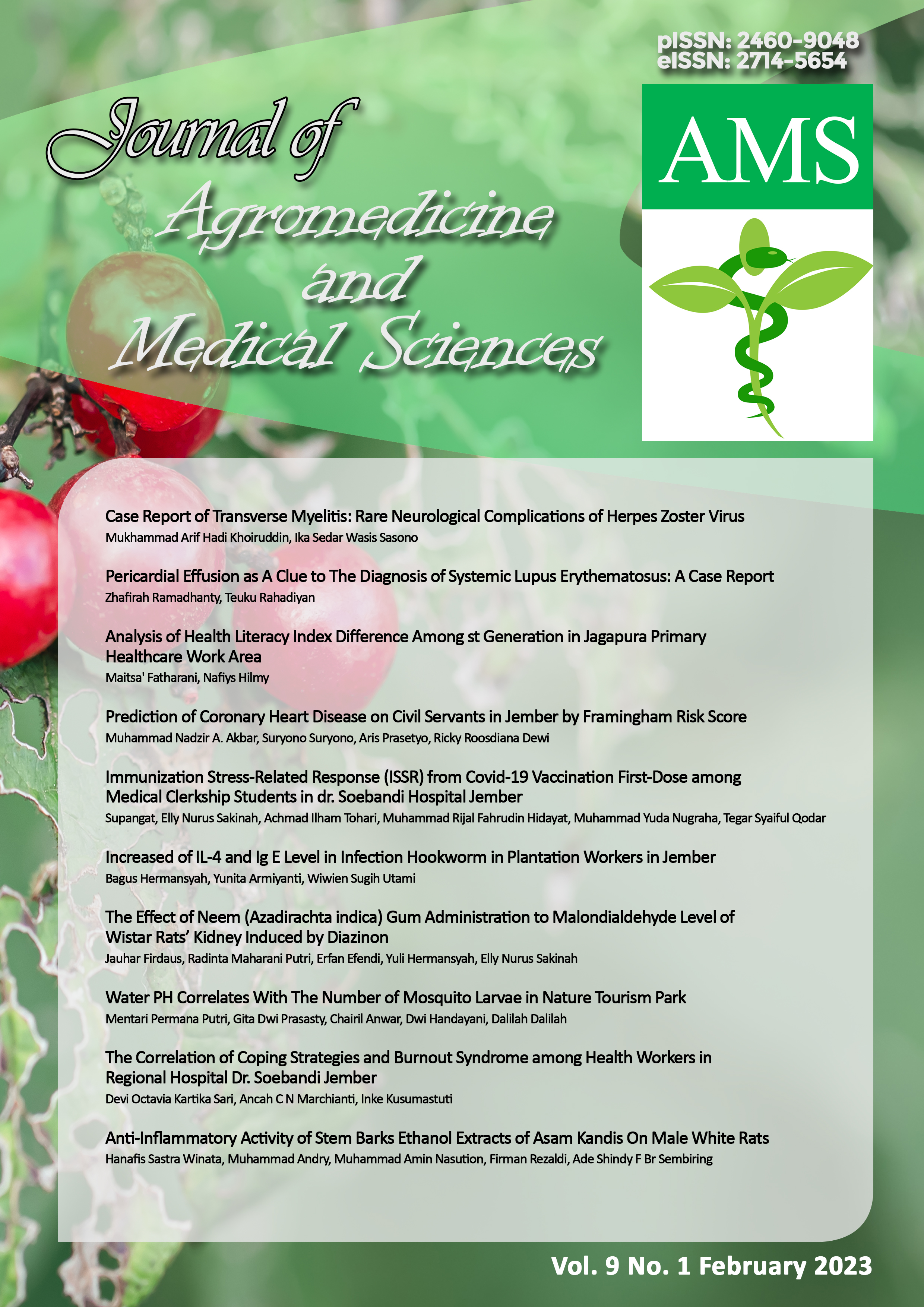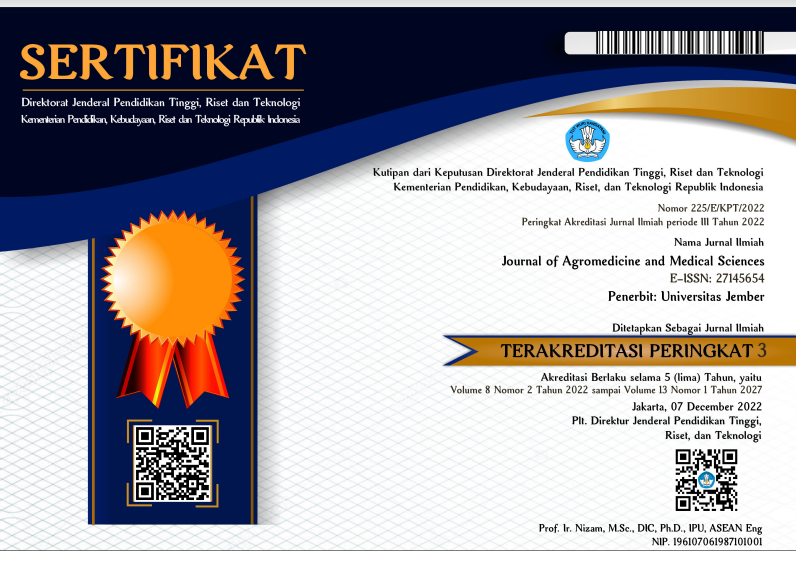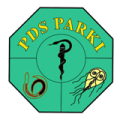Immunization Stress-Related Response (ISSR) from Covid-19 Vaccination First-Dose among Medical Clerkship Students in dr. Soebandi Hospital Jember
DOI:
https://doi.org/10.19184/ams.v9i1.26673Abstract
Vaccination is one of the recommended way to eradicate Covid-19 pandemic. Unfortunately, there are still many people who refuse to get vaccinated. One of the causes is anxiety about the side effects that occur after vaccination. With this misinformation about vaccines, public anxiety is getting higher, so that more and more people are hesitant to get vaccinated. The purpose of this study was to determine the level of anxiety related to vaccines in medical students who have more knowledge about vaccines than the general public society. The anxiety assessment method used was the Hamilton Rating Scale for Anxiety (HARS) questionnaire. There were 108 medical clerkship students in this study, consisting of 25 male respondents and 83 female respondents, aged between 21-27 years. Based on the HARS-score obtained, it showed that all respondents were in the low or minimal anxiety range. Aspects of anxiety predominately appeared in the pre-vaccination phase. The differences between men and women were influenced by hormonal fluctuations and conditions before vaccination, such as stress, workload, knowledge capacity, and information obtained related to vaccination.
Keywords: Anxiety, Covid-19, HARS-score, ISRR, Vaccines
Downloads
References
Baloran, E. T. (2020). Knowledge, Attitudes, Anxiety, and Coping Strategies of Students during COVID-19 Pandemic. Journal of Loss and Trauma, 25(8), 635–642. https://doi.org/10.1080/15325024.2020.1769300
Belov, O. O., & Pshuk, N. G. (2020). Age and gender features of depressive and anxiety symptomatics of depressive disorders. Wiadomosci Lekarskie (Warsaw, Poland : 1960), 73(7), 1476–1479.
Bendau, A., Plag, J., Petzold, M. B., & Ströhle, A. (2021). COVID-19 vaccine hesitancy and related fears and anxiety. International Immunopharmacology, 97, 107724. https://doi.org/10.1016/j.intimp.2021.107724
Bono, S. A., Faria de Moura Villela, E., Siau, C. S., Chen, W. S., Pengpid, S., Hasan, M. T., Sessou, P., Ditekemena, J. D., Amodan, B. O., Hosseinipour, M. C., Dolo, H., Siewe Fodjo, J. N., Low, W. Y., & Colebunders, R. (2021). Factors Affecting COVID-19 Vaccine Acceptance: An International Survey among Low- and Middle-Income Countries. Vaccines, 9(5). https://doi.org/10.3390/vaccines9050515
Burki, T. (2020). The online anti-vaccine movement in the age of COVID-19. The Lancet Digital Health, 2(10), e504–e505. https://doi.org/10.1016/S2589-7500(20)30227-2
Derryberry, D., & Reed, M. A. (2002). Anxiety-related attentional biases and their regulation by attentional control. Journal of Abnormal Psychology, 111(2), 225–236. https://doi.org/10.1037//0021-843x.111.2.225
El-Shitany, N. A., Harakeh, S., Badr-Eldin, S. M., Bagher, A. M., Eid, B., Almukadi, H., Alghamdi, B. S., Alahmadi, A. A., Hassan, N. A., Sindi, N., Alghamdi, S. A., Almohaimeed, H. M., Mohammedsaleh, Z. M., Al-Shaikh, T. M., Almuhayawi, M. S., Ali, S. S., & El-Hamamsy, M. (2021). Minor to Moderate Side Effects of Pfizer-BioNTech COVID-19 Vaccine Among Saudi Residents: A Retrospective Cross-Sectional Study. International Journal of General Medicine, 14, 1389–1401. https://doi.org/10.2147/IJGM.S310497
Eysenck, M., Payne, S., & Santos, R. (2006). Anxiety and depression: Past, present, and future events. Cognition & Emotion, 20(2), 274–294. https://doi.org/10.1080/02699930500220066
Hause, A. M., Gee, J., Johnson, T., Jazwa, A., Marquez, P., Miller, E., Su, J., Shimabukuro, T. T., & Shay, D. K. (2021).
Anxiety-Related Adverse Event Clusters After Janssen COVID-19 Vaccination — Five U.S. Mass Vaccination Sites, April 2021. MMWR. Morbidity and Mortality Weekly Report, 70(18), 685–688. https://doi.org/10.15585/mmwr.mm7018e3
Kalmbach, D. A., Abelson, J. L., Arnedt, J. T., Zhao, Z., Schubert, J. R., & Sen, S. (2019). Insomnia symptoms and short sleep predict anxiety and worry in response to stress exposure: a prospective cohort study of medical interns. Sleep Medicine, 55, 40–47. https://doi.org/10.1016/j.sleep.2018.12.001
Koltai, J., Raifman, J., Bor, J., McKee, M., & Stuckler, D. (2021). Does COVID-19 vaccination improve mental health? A difference-in-difference analysis of the Understanding Coronavirus in America study. MedRxiv : The Preprint Server for Health Sciences. https://doi.org/10.1101/2021.07.19.21260782
Kudielka, B. M., & Kirschbaum, C. (2005). Sex differences in HPA axis responses to stress: a review. Biological Psychology, 69(1), 113–132. https://doi.org/10.1016/j.biopsycho.2004.11.009
Levenson, R. W. (2014). The Autonomic Nervous System and Emotion. Emotion Review, 6(2), 100–112. https://doi.org/10.1177/1754073913512003
Liu, J., Dong, Q., Lu, X., Sun, J., Zhang, L., Wang, M., Liu, B., Ju, Y., Wan, P., Guo, H., Zhao, F., Zhang, X., Zhang, Y., & Li, L. (2020). Influence of comorbid anxiety symptoms on cognitive deficits in patients with major depressive disorder. Journal of Affective Disorders, 260, 91–96. https://doi.org/10.1016/j.jad.2019.08.091
Lockyer, B., Islam, S., Rahman, A., Dickerson, J., Pickett, K., Sheldon, T., Wright, J., McEachan, R., & Sheard, L. (2021). Understanding COVIDâ€19 misinformation and vaccine hesitancy in context: Findings from a qualitative study involving citizens in Bradford, UK. Health Expectations, 24(4), 1158–1167. https://doi.org/10.1111/hex.13240
Luine, V. N. (2007). The prefrontal cortex, gonadal hormones and memory. Hormones and Behavior, 51(2), 181–182. https://doi.org/10.1016/j.yhbeh.2006.09.001
Olthuis, J. v, Watt, M. C., & Stewart, S. H. (2014). Anxiety Sensitivity Index (ASI-3) subscales predict unique variance in anxiety and depressive symptoms. Journal of Anxiety Disorders, 28(2), 115–124. https://doi.org/10.1016/j.janxdis.2013.04.009
Palgi, Y., Bergman, Y. S., Ben-David, B., & Bodner, E. (2021). No psychological vaccination: Vaccine hesitancy is associated with negative psychiatric outcomes among Israelis who received COVID-19 vaccination. Journal of Affective Disorders, 287, 352–353. https://doi.org/10.1016/j.jad.2021.03.064
Reschke-Hernández, A. E., Okerstrom, K. L., Bowles Edwards, A., & Tranel, D. (2017). Sex and stress: Men and women show different cortisol responses to psychological stress induced by the Trier social stress test and the Iowa singing social stress test. Journal of Neuroscience Research, 95(1–2), 106–114. https://doi.org/10.1002/jnr.23851
Ruginski, I. T., Stefanucci, J. K., & Creem-Regehr, S. H. (2018). State Anxiety Influences Sex Differences in Spatial Learning (pp. 244–257). https://doi.org/10.1007/978-3-319-96385-3_17
Samulowitz, A., Gremyr, I., Eriksson, E., & Hensing, G. (2018). “Brave Men†and “Emotional Womenâ€: A Theory-Guided Literature Review on Gender Bias in Health Care and Gendered Norms towards Patients with Chronic Pain. Pain Research and Management, 2018, 1–14. https://doi.org/10.1155/2018/6358624
Sandin, B., Sánchez-Arribas, C., Chorot, P., & Valiente, R. M. (2015). Anxiety sensitivity, catastrophic misinterpretations and panic self-efficacy in the prediction of panic disorder severity: towards a tripartite cognitive model of panic disorder. Behaviour Research and Therapy, 67, 30–40. https://doi.org/10.1016/j.brat.2015.01.005
Solomon, M. B., & Herman, J. P. (2009). Sex differences in psychopathology: of gonads, adrenals and mental illness. Physiology & Behavior, 97(2), 250–258. https://doi.org/10.1016/j.physbeh.2009.02.033
Thompson, E. (2015). Hamilton Rating Scale for Anxiety (HAM-A). Occupational Medicine (Oxford, England), 65(7), 601. https://doi.org/10.1093/occmed/kqv054
Tran, V. D., Pak, T. v., Gribkova, E. I., Galkina, G. A., Loskutova, E. E., Dorofeeva, V. v., Dewey, R. S., Nguyen, K. T., & Pham, D. T. (2021). Determinants of COVID-19 vaccine acceptance in a high infection-rate country: a cross-sectional study in Russia. Pharmacy Practice, 19(1), 2276. https://doi.org/10.18549/PharmPract.2021.1.2276
WHO. (2020). Statement on the second meeting of the International Health Regulations (2005) Emergency Committee regarding the outbreak of novel coronavirus (2019-nCoV). Who.Int. https://www.who.int/news/item/27-04-2020-who-timeline---covid-19
Wiysonge, C. S., Ndwandwe, D., Ryan, J., Jaca, A., Batouré, O., Anya, B.-P. M., & Cooper, S. (2022). Vaccine hesitancy in the era of COVID-19: could lessons from the past help in divining the future? Human Vaccines & Immunotherapeutics, 18(1), 1–3. https://doi.org/10.1080/21645515.2021.1893062






















